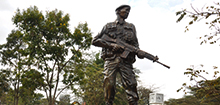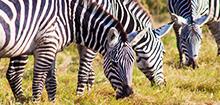
Date Published:
Tourism, Wildlife and Heritage Cabinet Secretary, Hon. Peninah Malonza has launched a countrywide compensation exercise for victims of human-wildlife conflicts in 46 counties. The victims or their dependants will receive over 908-million shillings as compensation covering the period 2014-2019.
Hon Malonza launched the compensation exercise at Voi stadium in Taita Taveta County at a grand ceremony attended by cabinet colleague Salim Mvurya, the Cabinet Secretary for Mining, Blue Economy and Maritime Affairs, Principal Secretary State Department for Wildlife Hon. Silvia Museiya, Taita Taveta Governor HE Andrew Mwandime, and other local leaders.
The Cabinet Secretary said victims of HWC in Taita Taveta County will receive 52 million shillings during this first phase covering 2014-2019, adding that the remaining balance will be paid once national treasury releases another batch of compensation money.
Hon. Malonza said an elaborate scheme has been put in place to have the compensation beneficiaries paid their monies directly to their bank accounts. While acknowledging that it is painful to lose human or livestock lives and destruction of property, including crops due to HWC, the Cabinet Secretary urged those receiving the money to invest it well to turn around their lives.
The local leaders led by Governor Mwadime called for fast-tracking of the completion of Mgeno-Kasigau-Bachuma electric fence to keep away wildlife from human settlements to curb HWC. While appreciating the government for releasing compensation money, the leaders called for the hastening of the exercise noting that release of funds was taking rather too long.
The Law that guides wildlife management in the Country; WCMA Act, 2013 provides for the establishment of a County Wildlife Conservation and Compensation Committee (CWCCC). This committee comprises of a chairperson appointed by the Cabinet Secretary, and this is the County Commissioner, four persons who are not public servants nominated by community, an officer from KWS who is the secretary and other relevant technical officers at the County Government level. This committee reviews all the lodged claims and makes appropriate recommendations to the Ministerial Wildlife Compensation Committee (MWCC) that validates and approves payment of the awards by the CWCCC.
Speaking during the same occasion, KWS chairman of Board of Trustees Lt. Gen. (Rtd) Walter Raria Koipaton called upon members of Community Wildlife Compensation Committees (CWCC) to exercise diligence in their work and apply the Wildlife Conservation and Management Act, 2013 to the letter to ensure that only deserving cases are compensated. He said it is important that members of CWCC are thorough and have good documentation of their deliberations so that both victims and the government get a fair deal in all compensation cases.
Lt. Gen. (Rtd) Koipaton urged those receiving compensation money to invest in enterprises that will not provoke conflicts with wildlife to avoid going through a vicious circle of filing compensation claims. He directed that the Enterprise Development department of KWS works closely with communities to explore viable economic ventures founded on supporting livelihoods as well as wildlife conservation.
The Acting KWS Director General, Dr Erustus Kanga said KWS has highly trained officers in wildlife management, noting they have worked hard to bring cases of human wildlife conflicts to the barest minimum. He singled out Problem Animal Management Unit (PAMU), which is comprised of highly trained mobile unit teams that can be split into fully equipped units that can be simultaneously deployed to high conflict zones to beef up the local PAC teams.
Dr. Kanga said the PAC and PAMU teams are frequently trained and share information and experiences to ensure they are abreast with current approaches to wildlife management. He said PAMU’s proactive approach to wildlife management has helped KWS in achieving an enhanced corporate image and positive public attitude towards wildlife conservation and management due to its swift responses.





